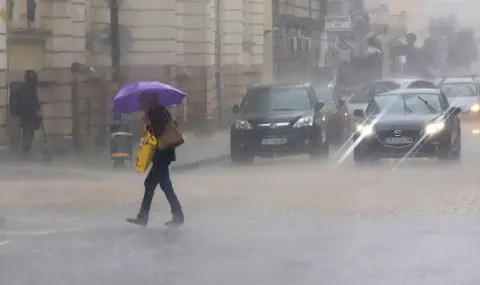The quality of the road infrastructure is hideous, but the biggest problem is in the brain, not in the drivers gearbox. How long is it going to be like this? Alexander Andreev is looking for the answer:
A motorcyclist slipped between two cars on the two-lane road, overtakes us on the center line and continues forward at about 140 km/h. At a limit of 40. To be honest, I expected to see him squished like a fly on the next sharp turn, but luckily the guy had apparently survived. This time.
Everyday life on the streets and roads in Bulgaria. According to various statistics, the country has the highest percentage of people killed in road accidents in the EU, and the victims are almost twice as many as the European average.
In the country during the whole of last year, there were 157 victims on the road, and only for the first half of 2024, according to media publications, the dead already number 115. This is the country which for road users continues to be among the most dangerous in the EU - according to the estimates of the European Commission.
The motorcyclist from a few days ago survived. The drivers of the two cars also apparently survived, who, with the same 40 km/h limit, were celebrating with the headlights of the cars in front, pressing them and, at the first opportunity, overtaking them on the left, right and on the emergency lane at a speed well over 100 km/h. Should we be surprised in this situation that, according to the experts, the main reason for the victims on the Bulgarian roads is "reckless driving"?
Black statistics have become everyday
Only within three days the following news appeared in the Bulgarian media:
"For a day, the Ministry of Internal Affairs identified 28 drunk and nine drugged drivers."
"A car crashed into a concrete wall and overturned on the Simitli-Kresna road."
"A 23-year-old motorcyclist hit a bus head-on and died."
And week after week the headlines sound similar. Yes, experts will tell you that the number of vehicles in thirty years has increased tremendously - only cars from 1.5 have reached nearly 4 million. And yet the number of victims in absolute numbers has fallen almost tenfold: according to the World Health Organization (WHO), in 1990, between 1,200 and 1,500 people died on the streets and roads of Bulgaria. In other words, the trend is good and we should not raise unnecessary alarm.
Shouldn't it? Not only the EU experts, but also anyone traveling through Bulgaria will tell you that the quality of the road infrastructure is abysmal, and the security of the vehicles can often be described as quite peculiar - or in jargon, "one to the goetere". For decades, since Zhivkov's time, the state has allegedly been building highways, but the infamous ring is still not connected. And you will often hear lines like: "Several hundred kilometers of highways sank like banknotes into the pockets of those in power." Or: "The Chinese would close the ring in just one year if someone gave them the government order."
The problem is not in the gearbox, but in the brain box
Whether it is so or not, whether it is exaggerated or understated - that no one can say. The fact is that many Bulgarians are still rolling their aging hedgehogs with worn tires and pads through the moonscape of the country's roads, and while they are not dying as massively as in 1990, the sheer number of broken limbs and sheet metal could definitely be seriously reduced .
But it's not just "reckless driving", it's not just bad roads and depreciated cars. Road accidents often start in the heads of road users. It's not the gearbox, it's the brain box. In it, the neurons have to transmit several very simple messages to each other: "Follow the rules", "Don't drive drunk or drugged", "Be tolerant of others". Instead, the neurons of part of the traffic participants emit other impulses: "The law is a door in the field", "I will pass a meter". Or as a driver called out to me, driving against the sign on a one-way street: "Go on, there's room for us to pass."
Yes, there was room for divergence. And we passed without incident on the street. But apparently we diverged dramatically in our attitudes to law and rules, to ethics and mutual respect.
The way to go is long
Here a cynical voice already laughs at me for writing platitudes. Yes, all this has been said and written thousands of times. Plus much more: about low education and low culture, about bought driver's licenses, about bribes and about the right of the strong on the roads, about the police or prosecutor's umbrellas. But maybe it's still worth repeating every day. There seems to be a benefit. Bulgarian drivers have already become accustomed to stopping at crosswalks and red lights, to fasten their seat belts and even to let you pass when you want to merge into the traffic.
Apparently, the number of conscientious and thinking participants in the movement in Bulgaria is growing, but it is still far from the critical mass. However, their example is very important. Even if not every one of them has heard of the "categorical imperative" of Kant.
***
This comment expresses the personal opinion of the author and may not coincide with the positions of the Bulgarian editorial office and of DV as a whole.
